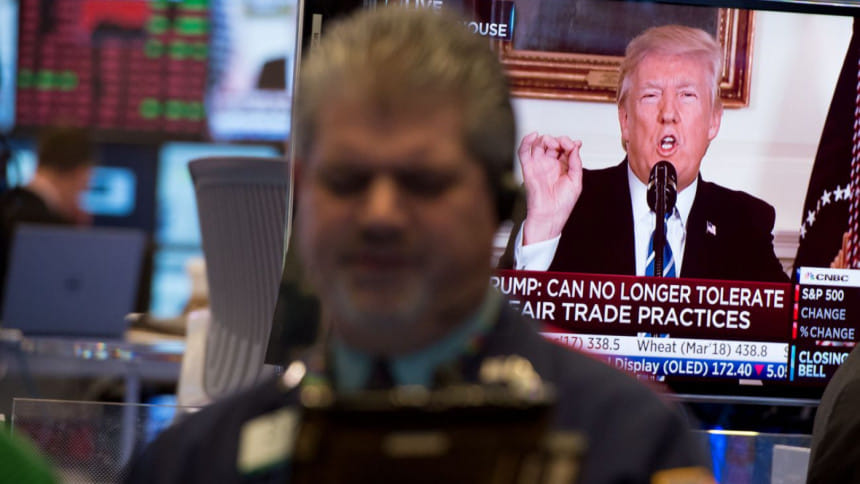Quantum of disarray

What with difficult-to-deal-with Mr Trump on one side and "revanchist" Mr Putin on the other, the world seems to be in a turbulent place right now. It appears others in the world arena are also queuing up to join this disarray to make matters worse for years to come.
What do the developing nations make of it and plan for it right now? In his weekly column of "American Account" in the Sunday Times on November 4, Irwin Stelzer laments, "…my colleague Walter Russell Mead argues that the 'crashing sound you heard in world markets last week wasn't just a correction. It was the sound of the end of an age…of relatively stable international relations…. The world has entered a new, complicated and dangerous era of nationalist competition…reverberating through the world's financial markets.'" The "crashing sound" was referring to a plunge in share prices in October that vapourised USD 4.5 trillion of the world's wealth, with almost half of that loss occurring in the US.
Worse still, we are entering that "dangerous era" devoid of weapons with which to fight or slow down a recession.
Jamie Dimon, CEO, JPMorgan Chase, voices a similar note of uncertainty on the world's economic performance with the threat of further tariffs by Trump and narrowing on nationalism. He, however, during a long interview on Bloomberg last weekend, stressed on efforts (by nations) to shore up on the economic front building on the positives that are already there.
The IMF whittled down the forecast for the global economy in 2018 and 2019 to 3.7 percent—0.2 percent below its prior estimate for both years. The Guardian warns, "If the current trade disputes were to escalate further, they could deliver a shock to a broader range of emerging and developing economies." The emerging countries' GDP growth rate may taper off to 4.7 percent. But if it comes to that, this will negate the consistent incremental growth pattern regarded as crucial to attain the SDGs by 2030.
Sweden, Denmark and Norway cope better with an economic downturn than most countries despite having an expensive welfare system. Two factors contributed to the Scandinavian success story: tighter regulation of the banking sector since the 1990s and a strong public sector employing five out of every eight workers in the region.
Bangladesh had come out virtually unscratched from the 2008-09 recession because of its huge domestic market and high volume of local demand sustaining the economy. Besides, it had fewer externalities linking it to the pulls and pressures of international financial markets.
Nevertheless, owing to the expansion and diversification of the economy or the size of its GDP over the last decade, there is need for caution.
On the positive side, we must step up efforts to optimise the benefits of a window of opportunity opening up to our garment manufacturers and exporters on account of the China-US trade war. Now we export cotton-based low- and middle-end apparels to the US market. We can of course raise the volume of such specific items with lower price tags. We will have to enter the higher-end non-cotton-based garments business to maximise earnings for the RMG sector. Let's have backward linkages for weaving and knitwear units. China can help us with technology, relocation and investment through the special economic zones we envision with the country.
The current account deficit crossed USD 10 billion in the recently concluded year. The deficit-to-GDP ratio was about 3.5 percent at the end of last fiscal year. Historically, the ratio had been between one percent and 1.5 percent in a fiscal year. If the trend continues, Bangladesh risks being an indebted country in the not-too-distant future.
Professor Naoyuki Yoshino, Dean of Asian Development Bank Institute (ADBI) and Professor Emeritus at Keio University, Japan advocated for "Hometown Investment Trust (HIT)" in Dhaka last month. It envisages a "stable way to supply risk capital" to support "poor people around big infrastructure projects—roads, railways and highways—through funds." This can help them start their own business, according to Professor Yoshino. Thus, a heartless abandonment of the poor under mega infrastructural projects will be replaced by inclusive and participative growth pattern. HIT has spread from Japan to Cambodia, Vietnam, Peru and Mongolia.
Exploring insurance, pension funds and other forms of savings may go hand in hand with bringing in increasing numbers of taxpayers who gleefully evade any semblance of accountability. This stands in cruel contradiction to banking defaults, capital flight, and splurge abroad in second-home glory. Some quality inward thinking is due.
Shah Husain Imam is Adjunct Faculty at East West University, a commentator on current affairs, and former Associate Editor, The Daily Star. Email: [email protected]





Comments